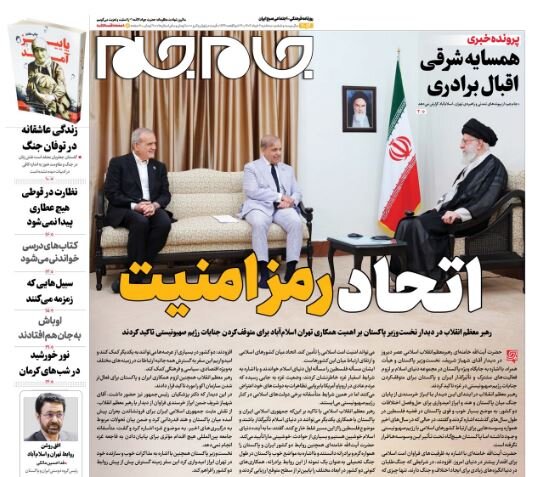Iran's unparalleled resistance

TEHRAN - In a note, Jam-e-Jam addressed Iran's unparalleled resistance, both during the Sacred Defense period and at other times.
It wrote: The experience of Iran's history from the beginning of the imposed war onwards has shown that national solidarity and social cohesion are still the most effective mechanisms for overcoming crises and facing international, economic, and security pressures. Scientific advances and achievements in new technologies have been made with the spirit of resistance and collective effort. These achievements have played a significant role in creating national deterrence and strengthening Iran's bargaining power in regional and trans-regional strategic interactions. The fact that many nations and independent movements have taken the example of the Iranian resistance experience has strengthened the Islamic resistance front and strategic stability against unilateral and hegemonic policies. The spirit of unity and determination has not only been a solid barrier against the waves of division in overcoming seditions, but also in facing domestic challenges and international competitions. It has emerged strong in the battlefield and diplomacy, and from striving for progress to defeating the enemy's hybrid war.
Sobh-e-No: Bitter experience of JCPOA promises
Sobh-e-No said while Western outlets report on Iran's proposal to create a nuclear consortium with the participation of regional countries and the United States, a closer look at the technical and political dimensions, and past experiences shows that this plan could undermine the country's strategic infrastructure in the nuclear industry. Such proposals are not unlike the failed experience of the JCPOA. The recent proposal under the guise of regional cooperation is the same "zero percent enrichment" that is now being put forward in a new language. If the enrichment program is halted domestically, the industry will suffer damage. If the domestic facilities were to be closed and nuclear work transferred to a joint factory on one of the Iranian islands, not only would the country’s technical equipment be destroyed, but in practice, the ownership and management of the factory would also be in the hands of the partner countries. Experience has shown that such plans are technically, economically, and sovereignly harmful and threaten Iran’s independence in the strategic nuclear field.
Etemad: Meeting with the mediator
In an analysis, Etemad discussed Mr. Pezeshkian’s visit to Oman and wrote: This visit carries a clear message about the depth and continuity of relations between Tehran and Muscat; relations that have deep roots in the history of regional diplomacy and have always been on the path of trust and cooperation during the most sensitive periods, including the peak of international pressure on Iran. Oman was one of the few states that not only did not cut off its relations with Iran, but also played a balanced and realistic role, becoming one of the main economic and political conduits of the Islamic Republic. It seems that history is repeating itself, and Muscat has once again become a key player in Iran’s regional interactions, in a situation where the prospects for the revival of the nuclear deal are unclear. Therefore, part of the agenda of the President's visit to Oman should be seen as pursuing bilateral economic agreements, joint investments, developing port cooperation, and increasing trade exchanges. Therefore, it seems that Muscat remains one of the few capitals where Tehran can engage in complex issues such as the nuclear file and relations with the United States, and simultaneously reinforce the foundations for long-term economic cooperation in the region.
Arman-e-Melli: Competition for a share in the JCPOA
In a commentary, Arman-e-Melli discussed the approach of Europe and the United States towards Iran and the negotiations. The paper said: One of the important points in this equation is the differences that exist between the United States and Europe. Many analysts believe that Europe, as one of the main players in the JCPOA, wants to maintain and even increase its share in the negotiation process more than the United States. European countries, under internal and external pressure, especially from the U.S. and Israel, are trying to adopt tougher positions against Iran and maintain their influence in the decision-making processes. Moreover, the U.S., which is no longer an official member of the JCPOA, looks at the negotiations differently, and its approach is more focused on pressure and the imposition of sanctions. These differences have pushed the talks into a state of uncertainty and increased pressure on Iran. However, it seems that Trump ultimately prefers an agreement with Iran because he knows the costs of conflict with Tehran and the regional Arab countries’ opposition to tension in the region.
Leave a Comment